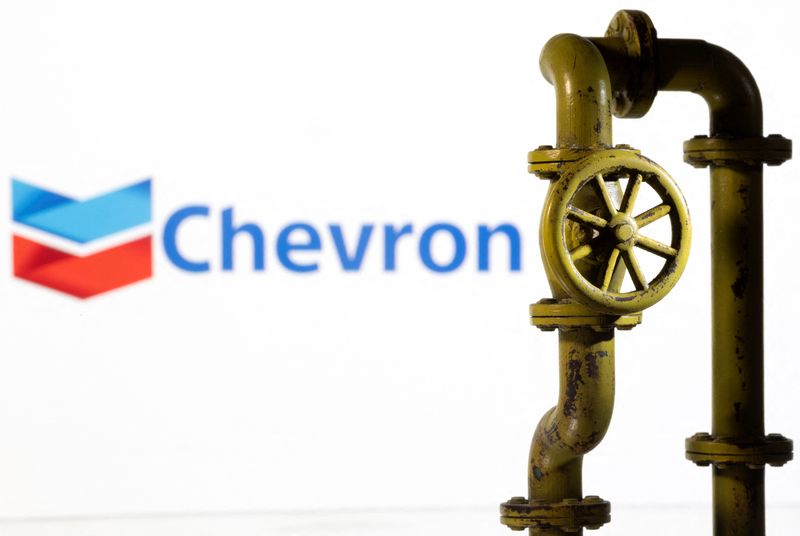By Sabrina Valle and Shariq Khan
HOUSTON (Reuters) - U.S. oil and gas producer Chevron Corp (NYSE:CVX) on Tuesday outlined a plan to raise buybacks and expand oil production through 2026, adding to long-term supply amid a tight market.
The announcement, part of Chevron's previously scheduled investor outlook, comes at a time when oil supplies are strained and prices are jumping with countries putting sanctions on oil exporter Russia over its invasion of Ukraine.
Chevron is "relatively less exposed than others in our industry" to the conflict, which played no influence in a decision to raise output by more than 3% per year through 2026, Chevron Chief Executive Mike Wirth said.
The second-largest U.S. oil producer plans to pump "well over" 3.5 million barrels of oil and gas per day (boepd) by 2026, Wirth said, up from 3.1 million boepd last year.
Chevron also raised its forecast for operating cash flow through 2026, benefiting from cost cuts and a recent surge in energy prices.
The company now expects to buy back between $5 billion and $10 billion of its shares every year, from $3 billion to $5 billion before. The program would be sustainable for five years with oil prices at $50 per barrel, Wirth said.
The buyback increase was "ahead of expectations" and "is the main positive" key takeaway from Chevron's annual update to investors, according to analysts Giacomo Romeo and Jamie Franklin from equity research firm Jefferies.
Major oil companies are responding to a jump in profits this year from higher oil and gas prices by giving back more cash to shareholders, many of whom have been frustrated by years of low returns.
So far, most shale operators have signaled that they plan to put capital returns above output growth, even as U.S. oil prices crossed $100 per barrel earlier this week.
"We're aiming to grow cash flow and return more of it to shareholders, leveraging our strengths to deliver lower carbon energy to a growing world," Wirth said in a statement.
Chevron maintained its prior forecast for annual upstream spending at between $15 billion and $17 billion through 2026 and is expecting to cut operating expenses per barrel by more than 10% from last year's levels.
The company's shares were up about 4% in early trading.
Chevron, which on Monday announced a $3 billion purchase of biodiesel maker Renewable Energy Group Inc, also reaffirmed its targets for lowering carbon intensity of its operations and growing new energy businesses.

Chevron holds a 15% interest in the Caspian Pipeline Consortium (CPC), which exported 1.1 million bpd of crude from Kazakhstan and 0.2 million bpd from Russia in 2021. It also has a 50% stake in Tengizchevroil (TCO), which is developing the Tengiz and Korolev crude oil fields in western Kazakhstan.
"We have had no indications from any government that operations of the Caspian pipeline consortium are likely to be interrupted," Wirth said. "Beyond the Caspian pipeline, we really have no other exposure to Russia and none to Ukraine."